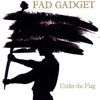Fad Gadget, "Under the Flag"
 In August of 1982, Mute released the 7" single for "Life on the Line," one month ahead of the forthcoming album. It was a stark contrast to the previous single, "Saturday Night Special," released only in February that year. This too was a catchy melody, but it was unashamedly supplied by a beefy synth and almost purely electric rhythm. Frank had decided to strip the producing and engineering team leaving only John Fryer and himself at the controls. The result is arguably the favorite amongst the fans.
In August of 1982, Mute released the 7" single for "Life on the Line," one month ahead of the forthcoming album. It was a stark contrast to the previous single, "Saturday Night Special," released only in February that year. This too was a catchy melody, but it was unashamedly supplied by a beefy synth and almost purely electric rhythm. Frank had decided to strip the producing and engineering team leaving only John Fryer and himself at the controls. The result is arguably the favorite amongst the fans.
For me, along with a number of other contemporary listeners, Under the Flag was the entry point for many Fad Gadget fans. The popularity of Depeche Mode and Yazoo in 1981 and 1982 gained Mute widespread attention, allowing for a warmer reception from press, radio, and retail. Licensing into other countries began to take place too, and imports of the Mute's UK pressings were finding their ways overseas.
With Under the Flag, Tovey scaled back his usage of conventional rock instruments to a degree, and even in the absence of Miller and Radcliffe, it was still a Mute family affair, with Alison Moyet on guest vocals (and saxophone!) and photography and painting by Anton Corbijn. At the time, Frank's first child was born and the Brits were involved in that whole Falkland Islands mess. Frank Tovey was eager to make personal political statements and the album has a lot of reflections on conflict and loss. Tovey didn't seem to be basking in the joy of fatherhood, but commenting on the bleak world which he was born into. For me,however, the music commands the most attention.
The album's opener and closer is a bit of a cliche story of man in hard times, finds work in the government as "a civil service tool," but it's the hypnotizing pulse of the sequencer that makes "Under the Flag I" a sheer audio delight. Without a moment's rest, the punchy and playful "Scapegoat" is already in motion. Tovey is joined on vocal duties both by a chorus and a female delivering a Dutch nursery rhyme, and two songs later, "Plainsong," features almost no instruments: mainly a chorus and Tovey.
The highlights of the album actually do correspond with the singles pulled from the record this time. In addition to the lovely (and of course, completely bleak) aforementioned "Life on the Line" is "Love Parasite," which became a popular favorite due to its fat syth bass hook and simple lyrical refrains. It's easily a musical blueprint for Depeche Mode's "Two Minute Warning," from Construction Time Again, a year later. It wasn't an A side, however, but its A side was the flooringly brilliant "For Whom the Bells Toll." It is one's another sad story of loss set to a undeniably fantastic groove, but this time with yelps coming from the chorus. (The yelps were unsurprisingly removed for the truncated single version, however.)
"Under the Flag II" closes the album and it almost seems like Frank, himself, is also getting tired of the political statement: "now the story's become a bore / I don't want to hear it anymore." I actually enjoy the more caustic approach in this version, as lines like "and now the masses have been fed / suck the offal from the dead / now the joker's here to pick the sores" are entertaining to hear.
Fad Gadget played live in support of the album through 1983 but only made it half-way through the tour. Frank returned home from the Netherlands with both legs in casts following a stage dive that landed him on some steps. Other war wounds for him from the tour included, as described in the liner notes, a broken nose, two black eyes, and numerous lacerations and contusions.
samples:




